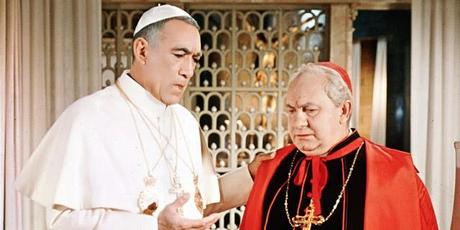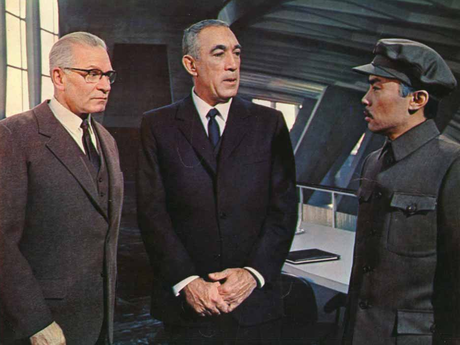 Michael Anderson's The Shoes of the Fisherman (1968) was an instant fossil: terrible in its day, even worse forty-six years later. Long, sonorous and boring, it mixes the worst elements of religious epics and topical dramas.
Michael Anderson's The Shoes of the Fisherman (1968) was an instant fossil: terrible in its day, even worse forty-six years later. Long, sonorous and boring, it mixes the worst elements of religious epics and topical dramas.Soviet Premier Kamenev (Laurence Olivier) releases Ukrainian Archbishop Kiril Lakota (Anthony Quinn) from a Siberian gulag. Exiled to the Vatican, Kiril becomes a Cardinal and after the Pope's (John Gielgud) demise, a reluctant pontiff. Kiril struggles in his new office, passing censure on skeptical Father Telemond (Oskar Werner) and negotiating between the USSR and China. When Chairman Peng (Burt Kwouk) rebuffs Kiril's overtures, he takes drastic action to avert conflict.
Based on Morris West's novel, The Shoes of the Fisherman miscalculates on every level. John Patrick and James Kennaway's script is an indigestible loaf of exposition and declarative dialog. Priests and premiers alike windily describe back stories, motivations and plot developments. Shoes has Kiril recount his harrowing prison experience, rather than showing it; kindly Kamenev shows no trace of the brutal commissar who tormented our hero. For slower viewers, American journalist George Faber (David Janssen) narrates the conclave like a football game.
Besides its leaden dramatics, Shoes completely lacks scale. Evidently, we're supposed to find Father Telemond's musings as momentous as nuclear Armageddon. The Sino-Soviet split's backgrounded until the last half-hour, despite motivating Kiril's release from prison. For that matter, Shoes doesn't even consider how the United States might react to Kiril's detente initiative. Instead, Anderson devotes an unconscionable amount of time to Faber's romantic entanglements and Kiril visiting Rome incognito.
That leaves our monumentally dull hero. Religious leaders make good protagonists when they're conflicted, flawed or at least charismatic. But Kiril is shamelessly immaculate: soft-spoken, humble and principled, solving the world's problems comes easily to him. He's briefly anguished over Telemond's persecution, until the theologian graciously forgives him. The Cardinals' opposition to his peace plan is only a momentary speed bump. What a guy, ending the Cold War by day and paying nocturnal visits to the sick and needy. Kiril makes John Paul II look like Pius XII.
 Anthony Quinn can't be faulted; he plays Kiril as written. Unusually subdued, Quinn invests key scenes with emotion, anguish and understated doubt. But for all his skill, he can't overcome a script which makes Kiril too pure to be believable and too boring to be likeable. Quinn's simply filling space, anchoring the movie without any chance of saving it.
Anthony Quinn can't be faulted; he plays Kiril as written. Unusually subdued, Quinn invests key scenes with emotion, anguish and understated doubt. But for all his skill, he can't overcome a script which makes Kiril too pure to be believable and too boring to be likeable. Quinn's simply filling space, anchoring the movie without any chance of saving it.Among the impressive cast, Oskar Werner brings vitality to his role, while Leo McKern's conflicted Cardinal salvages a few scenes. Others aren't so lucky. David Janssen shuffles listlessly between exposition, wife Barbara Jefford and mistress Rosemary Dexter. Laurence Olivier woodenly approximates a Russian accent; John Gielgud spends more time as a corpse than Pope; Burt Kwouk's fanatical Chairman barely registers. Vittorio De Sica, Frank Finlay, Isa Miranda and Niall MacGinnis languish in walk-on parts.
With story and characterization DOA, Shoes plays its dubious trump card. Anderson recreates Vatican splendor through intricate sets, Roman location shooting and copious stock footage. Along with the detailed recreations of Papal ceremonies, it provides aesthetic interest. But neither aureate sets or pompous Alex North music can redeem Anderson's pedestrian direction. What use is spectacle in a movie that's all talk - and boring talk, at that?
Aside from Richard Nixon, 1960s viewers avoided The Shoes of the Fisherman like the plague. Indeed it's so dense, humorless and wrongheaded it's impossible to imagine what audience the filmmakers envisioned. Shoes fails as religious drama, political thriller and entertainment: a steaming load of papal bull.

